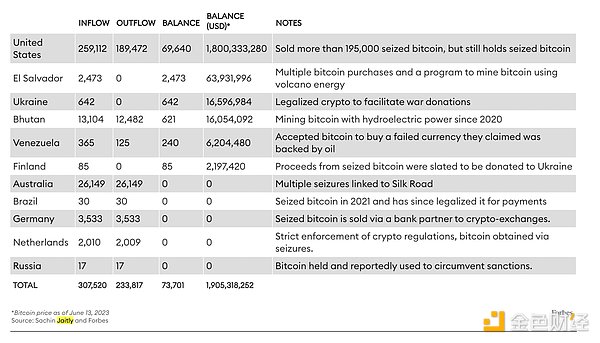Why is the US government reluctant to sell its 5 billion dollars worth of Bitcoin?
Why won't the US government sell $5 billion worth of Bitcoin?Author: Michael del Castillo, Forbes; Translation: Luffy, Foresight News
As the US government continues to crack down on cryptocurrency, it seems they have reached a point of intolerance. However, on the other hand of the love-hate relationship: The Department of the Treasury holds 207,189 bitcoins, worth $5 billion, the largest government bitcoin holdings in history.
While many other countries/regions are dealing with Bitcoin, the US government has steadily increased its Bitcoin reserves by confiscation. According to Sachin Jaitley, a general partner at investment consultancy Morgan Creek Capital, the US held 69,640 bitcoins last year, accounting for 94% of the total amount of bitcoins held by governments around the world.
Elementus, a New York-based cryptocurrency analysis start-up and a portfolio company of Morgan Creek, provided data for its research by comparing events such as the seizure of $1 billion worth of Bitcoin by the Justice Department in 2020 with the visible transaction records on the public Bitcoin blockchain. According to Elementus’ paper, “Through public information provided by the media and the blockchain, Elementus is able to create a map of sovereign crypto wallets and update and maintain it over time.”
- Encryption exchange “moving tide”: US SEC “strongly pushed away”, Middle East and Hong Kong “welcoming with a smile”
- BlackRock boosts the market but Bitcoin “looks fragile”
- Why is the US government “reluctant” to sell its 5 billion dollars worth of Bitcoin?
By 2022, the research covered 11 countries with Bitcoin holdings. “All of these bitcoins are held by these government agencies,” said Max Galka, CEO of Elementus. “But that doesn’t mean these governments hold only these bitcoins, nor that other governments haven’t used bitcoins.”
Comparing these holdings with currency supply information and inflation data over the past decade, the 42-year-old Jaitley concluded that “as currency supply grows and concerns about inflation intensify, the adoption of sovereign-level bitcoins is increasing, so there is a statistically significant relationship.” The study does not include North Korea, as they were unable to obtain inflation data from North Korea.

According to data from blockchain analysis company Elementus, this table shows Bitcoin flows from 11 countries from 2013 to 2022. Most of the assets come from government confiscations, and the information is incomplete.
This argument is not very rigorous. First of all, according to software engineer and researcher Jameson Lopp’s data, the United States sold a total of $366 million worth of Bitcoin in 11 auctions between 2014 and 2023. On the other hand, the government has clearly never bought Bitcoin, so while retaining most of the Bitcoin could be intentional, there has never been an intention to buy Bitcoin. In addition, data from Lope suggests that sales could lead to a potential appreciation loss of $4.8 billion.
Although Jaitley believes that the government’s ownership of Bitcoin is a means of hedging against inflation, given the size of the US government’s balance sheet, a $500 million reserve is unlikely to have any meaningful hedging effect. Jana Ringwald, a national prosecutor in Germany, said that immediate sale of confiscated assets is not mandatory in Germany. She said, “It’s 100% certain that some unsold items will be seized soon,” and “prosecutors may order” emergency sales, but they may not. “
Leslie Sammis is a criminal defense attorney in Tampa, whose practice includes several Binance forfeiture cases. He said that Justice Department bureaucrats are more likely to wait for a clearer picture of the overall situation with cryptocurrencies. “I think they may decide they need congressional legislation or Department of Justice policy to move all of these assets,” Sammis said. “
Forbes TechCrunch contacted the U.S. Marshals Service and the Inspector General’s Office of the Department of Justice to confirm the exact amount, but has not received a response.
We will continue to update Blocking; if you have any questions or suggestions, please contact us!
Was this article helpful?
93 out of 132 found this helpful
Related articles
- Why do 90% of institutional investors have a positive view on cryptocurrency but still not buy it?
- South Korean Professor tracking Do Kwon’s funds: Signs of Terra’s collapse were evident in early 2019
- Can the new BRC-20S open up the “DeFi summer” on Bitcoin?
- Full-Chain Cryptocurrency Market Protocol TapiocaDAO Completes $6 Million Funding
- Wu’s Weekly Picks: Fed Announces Pause on Interest Rate Hikes, China’s Central Bank Cuts Medium-term Lending Rate, Judge Rejects Freezing of Binance Assets, and Top 10 News (June 9-16)
- Binance and Coinbase face SEC charges: Detailed analysis of market reaction and impact
- Why did the crypto community react negatively to BlackRock’s “wind-facing” application for a Bitcoin ETF?




